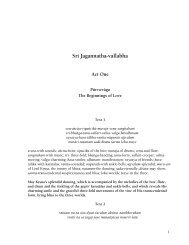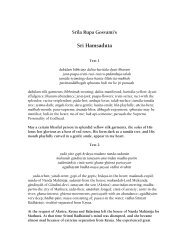Srimad Bhagavatam, Volume 3
Srimad Bhagavatam, Volume 3
Srimad Bhagavatam, Volume 3
Create successful ePaper yourself
Turn your PDF publications into a flip-book with our unique Google optimized e-Paper software.
activities of Vidura within the palace politics, made him wellknown as partial<br />
to the Pandavs and Maharaja Yudhistira has relerred to the past history of<br />
Vidura before his going away from home for prolonged pilgim's journey.<br />
Maharaj Yudhisthira reminded him whether he was equally kind and partial to<br />
his grown up nephews even after the battle of Kurukshetra a great disaster of<br />
family quarrel.<br />
Before the battle of Kurukshetra Dhritarastra's policy was peaceful<br />
annihilation of his nephews and therefore he ordered Purochana to build up a<br />
house of lac at Varanabat and when the building was finished Dhritarastra<br />
desired that his brother's family may live there for some time. When the<br />
Pandavas were going there in the presence of all the members of the royal<br />
family, Vidura tactfully gave instructions to the Pandavas about the future<br />
plan of Dhritarastra. This is specifically described in the Mahabharata (Ch.<br />
144 Adiparva.) He gave hint indirectly "that even an weapon not made of<br />
steel or any other material element can be more sharpen to kill the enemy and<br />
who knows this is never killed". That is to say he gave hint that the party of<br />
the Pandavas was being sent to Varanabat for the sake of being killed and thus<br />
he gave hint to Yudhisthira to become very careful in their new residential<br />
palace. He also gave indication of fire and said that fire cannot extingush the<br />
soul but it can do so for the material body but one who peotects the soul can<br />
live on!y. Kunti could not follow such indirect conversations between<br />
Maharaj Yudhisthira and Vidura and thus when she enquired from her son<br />
about the purport of the conversation, Yudhisthira replied that from the talks<br />
of Vidura it is understood that there is hint of fire in the house where they<br />
were proceeding. Later on Vidura came in disguise to the Pandavas and<br />
informed them that the house keeper was going to set fire in the house on the<br />
fourteenth night of waning moon. It was an intrigue of Dhritarastra that the<br />
Pandavas might die all together with their mother. And by his warning the<br />
Pandavas escaped through a tunnel underneath the earth so that their escape<br />
was also unknown to Dhritarastra so much so that after setting in the fire the<br />
Kouravas became as sure as anything about the death of the Pandavas and<br />
Dhritarastra performed the last rites of death with great cheerfulness. And<br />
during the mourning period all the members of the palace became<br />
overwhelmed with lamentation but Vidura did not become so on account of<br />
his knowledge that the Pandavas were alive somewhere underneath the sky.<br />
There are many such incidences of calamities and in each of them Vidura<br />
gave protection to the Pandavas on one hand and on the other he tried to<br />
restrain his brother Dhritarastra from such intriguing policy. Therefore, he<br />
was always partial to the Pandavas as much as the bird protects its eggs by the<br />
wing.<br />
Kaya vrittya vartitam vas charadbhi kshitimandalam<br />
Teerthani kshetramukhyani sevitani iha bhutale.<br />
While travelling on the surface ofthe earth how did you maintain your<br />
livelihood and while doing so which of the principal holy places and<br />
pilgrimages on the earth you have served.<br />
Vidura went out from the palace for detaching himself from the household<br />
affairs especially in the matter of political intrigues. As referred to<br />
hereinbefore, he was practically insulted by Duryodhone by calling him the<br />
son of a Sudrani although it was not out of place to talk loosely in the case of<br />
one's grandmother. Vidura's mother although a Sudrani she was grand-mother<br />
of Duryodhone and funny talks are sometimes allowed in the matter of grandmother<br />
and grandchildren. But because the remark was actual fact and figure<br />
it was unpalatable talk for Vidura and it was accepted as direct insult for him.<br />
He therefore decided to quit his paternal house and prepare himself for the<br />
renounced order of life. This preparatory stage is called Vanaprastha Ashram<br />
or retired life for travelling and visiting the holy places on the surface of the<br />
earth. In the holy places of India like Vrindaban, Haridwar, Jagannath Puri,<br />
Prayag etc, there are many great devotees and still there are free kitchen<br />
houses for persons who desire to advance spiritually. Maharaj Yudhisthira<br />
was inquisitive to learn whether Vidura maintained himself by the mercy of<br />
the free kitchen houses (chhatras).<br />
Bhavat vida bhagwatas teertha bhutah swayam bibho<br />
Teerthi kurvanti teerthani swantasthena gadabhrita.<br />
Bhavat—your goodself, Vida—like, Bhagwatas—devotees, Teertha—the<br />
holy places of pilgrimage, Bhuta—converted into, Swayam—personally,<br />
Bibho—oh the powerful, Teertha—made into holy place, Kurvanti—do<br />
render, Teerthani—the holy places, Swantasthena—having been situated in<br />
the heart, Gadabhrita—the personality of Godhead.<br />
My Lord! devotees like your goodself are themselves holy places in<br />
person. Because you carry with you, within your heart, the Personality of<br />
Godhead and as such you render all places into a pilgrimage.<br />
The Personality of Godhead is omnipresent by His diverse potencies<br />
everywhere just like the electricity power is distributed everywhere within the<br />
space. Similarly the Lord's omnipresence is perceived and manifested by His<br />
unalloyed devotees like Vidura as much as the electricity power is manifested<br />
in the electric bulb. A pure devotee like Vidura always feel the presence of the<br />
Lord everywhere. He sees everything in the potency of the Lord and the Lord<br />
3<br />
Thirteenth Chapter - Dhritarastra Quits Home<br />
in everything. The holy places all over the earth are meant for purifying the<br />
poluted consciousness Of the human being by an atmosphere surcharged with<br />
the presence of the Lord's unalloyed devotees. If any one visits a holy place he<br />
must search out for the pure devotees residing in such holy places, take<br />
lessons form them try to aply such instructions in practical life and thus<br />
gradually prepare oneself for the ultimate salvation of going back to Godhead.<br />
To go to some holy place of pilgrimage does not mean only to take bath in the<br />
Ganges or Jamuna or to visit the temples situated in those places. One should<br />
find out also representatives of Vidura who have no other desire in life save<br />
and except to serve the Personality of Godhead. The Personality of Godhead<br />
is always with such pure devotees on account of such pure devotee's<br />
unalloyed service without any tinge of fruitive action or utopians peculation.<br />
They are in the actual service of the Lord specifically by the process of<br />
hearing and chanting. The pure devotees hear from the authorities and chant<br />
them by singing and writing the glories of the Lord. Mahamuni Vyasdeva<br />
heard it from Narada and then he chanted in writing: Sukhdev Goswami<br />
studied it from his father and he described it to Parikshit: that is the way of<br />
<strong>Srimad</strong> Bhagwatam. So by their actions only the pure devotees of the Lord<br />
can render any place turned into a pilgrimage and the holy places become<br />
worth the name only on their account. Such pure devotees are able to rectify<br />
the poluted atmosphere of any place and what to speak of a holy place<br />
rendered unholy by the questionable actions of interested persons who try to<br />
adopt a professional life at the cost of the reputation of a holy place.<br />
Api nah suhridas tata bandhavah krishnadevatah<br />
Dristah sruta va yadavah swapuryam sukhamasate.<br />
Api--whether, Nah--our, Suhridas--well wishers, Krishnadevatah--those who<br />
are always wrapt in the service of the Lord Sri Krishna, Dristah--by seeing<br />
them, Sruta--or by hearing about them, Va--either, Yadavah--the descendants<br />
of Yadu, Swapuryam--along with their residential place, Sukhamasate--if they<br />
are all happy.<br />
My uncle! you must have visited the holy pilgrimage Dwarka and in that<br />
holy place there are our friends and well wishers the descendant of Yadu<br />
who are always wrapt in the service of the Lord Shri Krishna. You might<br />
have either seen them or heard about them. Are they all living happily in<br />
their abode ?<br />
The particular word 'Krishnadevata' i.e. those who are always wrapt in the<br />
service of Lord Krishna is significant. The Yadavas, the Pandavas who were<br />
always wrapt in the thought of Lord Krishna by His different transcendental<br />
activities were all pure devotees of the Lord like Vidura. Vidura left home<br />
inorder to devote himself completely in the service of the Lord but the<br />
Pandavas and the Yadavas were always wrapt in thought of Lord Krishna. As<br />
such there is no difference in their pure devotional qualities. Do remain at<br />
home or go out of home the real qualification of a pure devotee is to become<br />
wrapt in thought of Krishna favourably i.e. knowing well that Lord Krishna is<br />
the absolute Personality of Godhed. Kanasa, Jarasandha, Sisupala and other<br />
demons like them were also always wrapt in thought of Lord Krishna but they<br />
did it in a different way namely unfavourably or thinking Him to be a<br />
powerful man only (?) Therefore, Kansas and Sisupalas are not on the same<br />
level of pure devotees like Vidura, the Pandavas or the Yadavas.<br />
Maharaj Yudhisthira was also always wrapt in thought of Lord Krishna and<br />
his associates at Dwarka. Otherwise he would not have asked first of all about<br />
them from Vidura. Maharaj Yudhisthira is, therefore, on the same level of<br />
devotion like Vidura although he was engaged in the state affairs of the<br />
kingdom of world.<br />
Iti ukto dharmarajena sarvam tat samavarnayat<br />
Yathanubhutam kramaso vina yadukulakshayam.<br />
Iti--thus, Ukto--being asked, Dharmarajena--by king Yudhisthira, Sarvam--all,<br />
Tat--that, Samavarnayat--properly described, Yathanubhutam--as he<br />
experienced, Kramaso--one after another, Vina--without, Yadukulashayamannihilation<br />
of the Yadu-dynasty.<br />
Thus being asked by Maharaj Yudhisthir, Mahatma Vidura gradually<br />
one after another described everything what he personally experienced<br />
except the news of annihilation of the Yadu dynasty.<br />
Nanwapriyam durvisaham nrinam swayam upastitham<br />
Na avedayat sakaruno dukhitam drastum akshamah.<br />
Nanu--as a matter of fact, Apriyam--unpalatable, Durvisaham--unbearable,<br />
Nrinam--of the human kind, Swayam--in its own way, Upasthitamappearance,<br />
Na--did not, Avedayat--expressed, Sakaruno--compassionate,<br />
Duhkhitan-distressed, Akshamam--unable.<br />
Compassionate Mahatma Vidura was unable to see the Pandavas<br />
distressed at any time. As such he did not disclose this unpalatable and<br />
unbearble incidence to the Pandavas because such calamities were to<br />
come in their own way.<br />
According to Nitisastra (civic laws) one may not speak unpallatable truth to<br />
cause distress for others. Distress come upon us in its own way by the laws of<br />
nature and one may not aggravate it by propaganda. For compassionate soul












